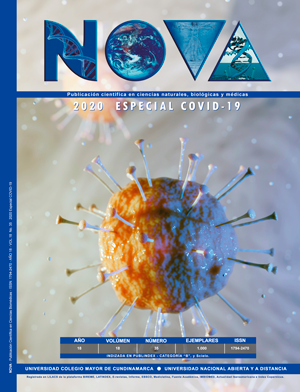NOVA por http://www.unicolmayor.edu.co/publicaciones/index.php/nova se distribuye bajo una licencia Reconocimiento No Comercial- Compartir igual
Así mismo, los autores mantienen sus derechos de propiedad intelectual sobre los artículos,
Declaración de privacidad.
Los nombres y las direcciones de correo electrónico introducidos en esta revista se usarán exclusivamente para los fines establecidos en ella y no se proporcionarán a terceros o para su uso con otros fines.
MOLECULAR DIAGNOSIS OF SARS-CoV-2
COVID-19 diagnosis is based on both clinical aspects and screening tests. However, clinical symptoms and signs in infected patients are highly atypical; hence, molecular tests are essential for diagnosis. RT-qPCR is carried out at BSL II level laboratories; the main molecular targets for viral detection are E gene (envelope), and RdRP gene (RNA-dependent RNA polymerase). False negatives in this diagnosis are due to sample quality and quantity, transport conditions, storage and handling before and after extraction (RNA is heat-labile and RNases are abundant); infection phase; virus mutations and presence of CRP inhibitors. Taking into account analytical sensitivity of RT-qPCR (5.2 copies of RNA / reaction) and the fact that once RNA it is extracted, it progressively degrades and affects test diagnostic sensitivity, a new sample -specifically taken from the lower respiratory tract in order to increase viral load- is recommended in the abovementioned cases. Timely diagnosis allows optimizing management (isolation and treatment), patient monitoring, implementing prevention and control measures as well as epidemiological surveillance of the disease









